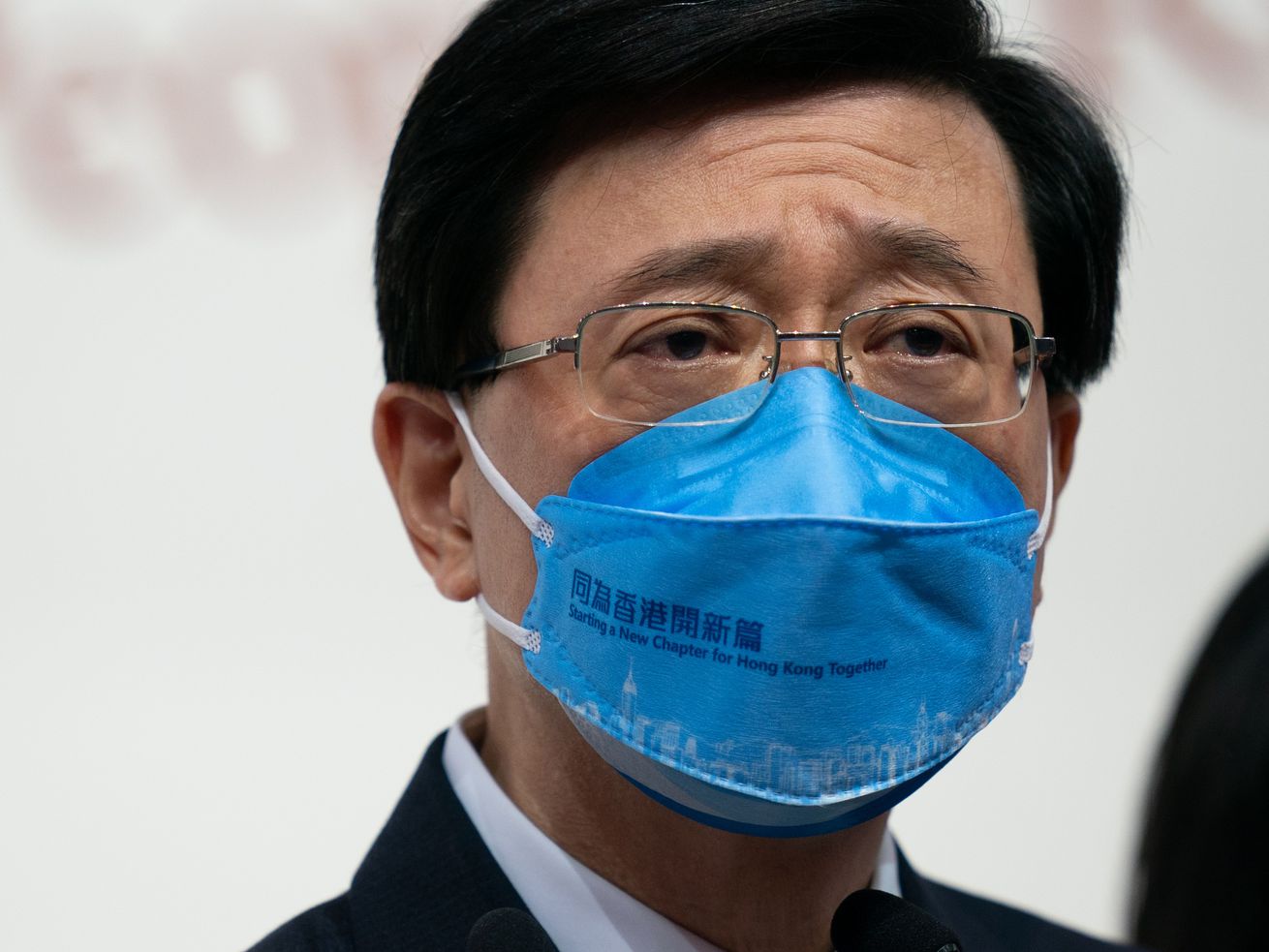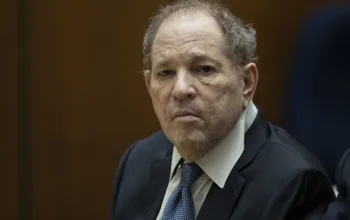Lee ran uncontested and won 99 percent of the vote.
John Lee is the new chief executive of Hong Kong. The 64-year-old ran the only approved campaign to succeed Carrie Lam, the embattled head of the Chinese territory who oversaw a dramatic degradation to democratic institutions throughout 2019’s pro-democracy protests. Lee’s tenure will likely bring more of the same: a former deputy chief of Hong Kong’s police force, he was instrumental in the brutal crackdowns on pro-democracy activists.
As the sole Beijing-approved candidate to replace Lam, Lee’s victory was all but assured as soon as he announced his candidacy. While Hong Kong doesn’t have what Americans would recognize as a democratic electoral system, previous elections have seen multiple candidates vie for Hong Kong’s top job. But this year, Lee was the only person Beijing apparently deemed sufficiently loyal to China’s Communist Party under its new electoral policies for Hong Kong, unveiled last March. He won handily with 99 percent of the votes from the 1,500-member electoral commission.
Since 2019, the Chinese government has instituted laws and policies which have eroded the relative autonomy that Hong Kong enjoyed after the territory was returned from the UK to China in 1997. Protests about changes to extradition laws, which would allow Hong Kong residents accused of crimes could be extradited to mainland China for trial, erupted across the region amid demands for strengthened democratic institutions. Those protests, although they were effective in indefinitely delaying the extradition laws, resulted ultimately in a national security law being enacted. Under that law, many high-profile activists like Agnes Chow, a pro-democracy activist and member of pro-democracy civil society group Demosisto, as well as opposition politicians and business leaders, were arrested. Since then, a “climate of fear” has pervaded the city and virtually extinguished the democratic resistance movement, according to a February 2021 analysis by Thomas E. Kellogg and Lydia Wong of the Georgetown Center for Asian Law. (Lydia Wong is a pseudonym for a scholar operating in the People’s Republic of China.)
The government in mainland China also instituted several reforms to Hong Kong’s governing structure, which helped solidify China’s control over the city, as Michael Martin of the Center for Strategic and International Studies outlined in a February report. Twelve pro-democracy candidates were barred from running in the 2020 Legislative Council (Hong Kong’s legislature, often shortened to LegCo) elections, which were then postponed until December 2021. In the intervening time, China’s Standing Committee of the National People’s Congress (NPC), with Lam’s help, instituted changes to Hong Kong’s Basic Law — the city’s governing charter — assuring a greater proportion of seats on the LegCo would friendly to China.
The Standing Committee of the NPC also created an institution to vet potential political candidates, the Candidate Eligibility Review Committee, or CERC. As of April 14, the CERC had only four members — all unelected government officials — and three non-official members, according to a government press release. Lee, now poised to take over as Hong Kong’s chief executive, was until April 7 the chair of the CERC.
John Lee, cop
Prior to joining Hong Kong’s government as Chief Secretary for Administration — the second-most powerful position in the government — Lee was the deputy head of the police force and a career cop, having joined the force in 1977. He’ll be the first chief executive from the police force in the 25 years since its handover to China, and will take office on July 1, the anniversary of that day.
Over the past four decades, Lee rose through the ranks of the city’s police force to become the Secretary of Security, overseeing the city’s police force during the 2019 protests over the extradition bill (for which, according to the BBC, Lee was a strong advocate). During his tenure, Hong Kong police were strongly criticized for using excessive force, such as deploying rubber bullets, tear gas, and water cannons, and occasionally using live ammunition against protesters. Lee defended the use of force and the response to the protest, including the National Security Law, saying it had helped “restore stability from chaos.”
Lee has also said he intends to enact legislation that will “prohibit any act of treason, secession, sedition, subversion,” which is legal under Article 23 of Hong Kong’s Basic Law, in a bid to rid the city of “the ideology of Hong Kong independence, violence and extremism.”
While his policies and response to the 2019 and 2020 pro-democracy protests clearly pleased Beijing, the US Treasury Department sanctioned Lee, Lam, and other government officials for “undermining Hong Kong’s autonomy and restricting the freedom of expression or assembly of the citizens of Hong Kong” in August 2020. Lee was specifically designated for his role in “coercing, arresting, detaining, or imprisoning individuals under the authority of the National Security Law, as well as being involved in its development, adoption, or implementation,” according to a press release from the Office of Foreign Assets Control. However, given that the order applies only to assets that are in the US or under the control of US persons, it won’t likely affect his economic status. It could potentially raise complications as Lee tries to salvage Hong Kong’s economy after the Covid-19 pandemic and the National Security Law pushed foreigners and international firms out of the city, though.
Lee’s selection isn’t completely without precedent, either. Beijing has often had a preferred candidate in the contest for chief executive. But the uncontested run of the former security chief is almost too on-the-nose after pro-democracy activism and calls for Hong Kong independence threatened China’s grip on the city. It also points to the erosion of the civil service in Hong Kong. Lee’s not part of the civil service and political class, or a business leader, as past chief executives have been. Rather, the valuable expertise he brings to the job is his loyalty to Beijing, Kenneth Chan Ka-lok, formerly a pro-democracy lawmaker and associate professor at Hong Kong Baptist University, told the Washington Post in April, after Lee announced his candidacy. “What matters most is that Lee is a cadre appointed by Beijing. As long as he can serve his master well, [Hong Kong’s] pro-establishment side will not have a voice that deviates far from his,” he said.
The fact that loyalty, rather than competency, is the most important quality for leadership in Hong Kong doesn’t bode particularly well for the future, Ho-fung Hung, a professor of political economy at Johns Hopkins University and an expert on the politics of Hong Kong told the Post. Hung predicted that Lee’s leadership points to the “gradual erosion of professionalism spirit in Hong Kong in all quarters of society will be continuing or even speeding up.”
Hong Kong’s business ties
Lee’s lack of experience — either in government or in business — puts him in a tough position when it comes to one of the main mandates of his leadership: rebuilding Hong Kong’s economy after the one-two punch of the National Security Law and the Covid-19 pandemic.
Hong Kong has occupied a middle place over the past 25 years, with a degree of social and political autonomy far exceeding that of mainland China — encompassed in the “one party, two systems” philosophy that has governed Hong Kong since 1997. That level of Western-style openness and freedom, coupled with tax breaks, attracted international companies and thousands of expats. However, as the Associated Press reported last year, a survey from the American Chamber of Commerce last year showed that 40 percent of expats surveyed that May were considering leaving Hong Kong due to the National Security Law, and many international companies moved their operations elsewhere.
Furthermore, the Covid-19 pandemic shut off the city, and breakouts crippled the health system. The dynamic zero-Covid policy employed by the Chinese government has added to the exodus, with more than 150,000 people leaving since the beginning of 2022, according to Al Jazeera. “It’s an unarguable fact that we have a brain drain and some senior management of some corporates have left Hong Kong,” Lam said of the city’s Covid-19 policies.
Lee is tasked with shoring up Hong Kong’s business sector once again, but instead of luring international companies back, perhaps with a less restrictive political atmosphere and Covid-19 policy, he’s proposing a different approach altogether: Opening the border with mainland China and developing the northern part of the island, the so-called Northern Metropolis, as an option to alleviate the city’s housing crisis — and shore up connections with the mainland.
“He may be a decisive leader. He may make the city function better. That’s true. But he’s not a businessman. He doesn’t have links to business,” Tara Joseph, the former president of the American Chamber of Commerce in Hong Kong, told Al Jazeera. “He has links to the security apparatus.”
Author: Ellen Ioanes
Read More



